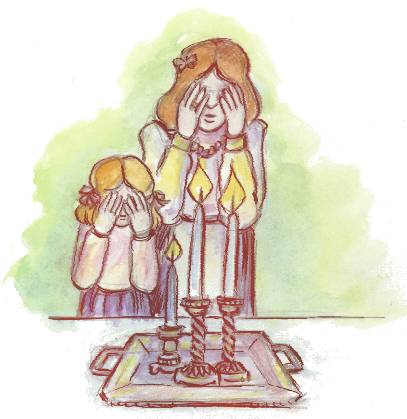Last Shabbat, my 7-year-old daughter Shoshi had a sleepover guest from her second-grade class. Tzivia is a vibrant, well-mannered and fun girl; a great match for Shoshi.
Since the Lubavitcher Rebbe encouraged girls to begin lighting Shabbat candles from the age of three, Shoshi and Tzivia each lit their respective candles to usher in Shabbat.
They each pronounced the blessing l’hadlik ner shel Shabbos kodesh (to kindle the light in honor of the holy Shabbat), and then Shoshi whispered to Tzivia, “Do you know what to do now?”
She then continued in her hushed tone, “Menachem Mendel ben Devorah Leah,” mentioning the name of an infant who needs blessings for a complete and speedy recovery.
The Baal Shem Tov taught that we have to go to great extremes to fulfill the Biblical injunction of “Love your neighbor as yourself” — even if you have never met the person.
True love of another is not contingent on their positive qualities, or what they may do or provide for you. Rather, we love another simply for who they are.
* * *
This Monday marks a watershed day on the Jewish calendar. Commonly referred to as “Yud-Tes Kislev” (the 19th day of the month of Kislev). On this day in 1798, Rabbi Schneur Zalman of Liadi was freed from imprisonment in Czarist Russia.
Rabbi Schneur Zalman – the author of the Tanya and the first Lubavitcher Rebbe – was a student of Rabbi Dovber of Mezritch, who was the student of the Baal Shem Tov. He was imprisoned, under capital sentence, on the pretext that his teachings threatened the authority of the Czar.
While the spreading of Chassidic teachings had already begun years earlier with the Baal Shem Tov, Rabbi Schneur Zalman’s release from prison heralded a new era in the dissemination of the “inner soul” of Torah.
Rabbi Schneur Zalman – as well as his successors – gathered many students, and implanted within them a love of their fellow. They taught their disciples to go to great extremes to help another.
The famed Chassid, Rabbi Mendel Futerfas — who was himself imprisoned in Siberian work camps for the heinous crimes of teaching Torah — once recounted that during a particularly difficult period of hunger in Russia, he had a regular study session of Chassidic teachings with someone named Leib, who volunteered in the Chevra Kadisha (ritual burial society), and was also a gravedigger.
One evening, when Leib arrived for their study session, Reb Mendel inquired, “What happened today at the cemetery?”
“Today, they brought thirty people who passed away from hunger. There simply wasn’t enough time to bury all of them in one day, and five corpses remained.
“I placed their bodies on the ritual purification tables. They lay next to each other, facing upwards, and no one looked at the person next to them…”
When Reb Mendel told this incident, he concluded that, “At that moment, I understood what it means to be dead: Someone who doesn’t think about another’s concerns, doesn’t look at him and doesn’t speak to him…”
Friends, it goes without saying that it’s not sufficient to live our lives for ourselves. If we don’t infuse every one of our actions with Ahavat Yisrael (love of our fellow), then what are we doing? Every single one of my actions needs to be infused with true love and concern for another, even for someone whom I have never met. Now just imagine the expression of love we are meant to have for those whom we doknow.

